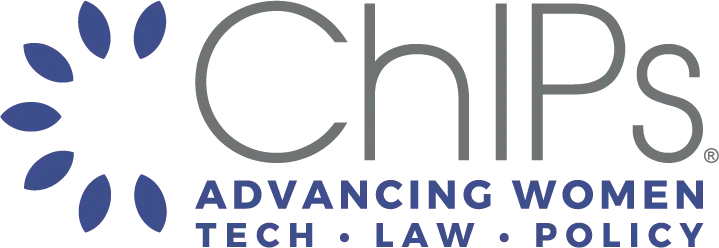The roster for “Expanding Female Equity in Global IP” during ChIPs Global Summit 2023 November 9 in San Francisco, was phenomenal, intimidating almost: Moderator Vaishali Udupa, commissioner for patents at the USPTO, was joined by panelists Monica Grewal of WilmerHale, Dr. Ruthie Lyle, principal technical patent architect at NVIDIA, Chi Chang, head of patents at Apple, and Jane Shi, principal research scientist at Amazon in Amazon Robotics.
Why “almost” intimidating? Because the conversation was anything but. Here is what you might have overheard in response to the questions: “How did you get where you are and what are you most proud of?”: “Try anything . . . and always file for inventions.” “I am here to be an inspiration for the next generation.” “I am proud of my team.”
So it turns out when you hear from women who are prolific patent filers and have been at the forefront of revolutionary technology – both earthbound and extraterrestrial (yes, literally, think Space Shuttle) – the focus is humility, encouragement, collaboration, and especially sponsoring the next generation of women. The focus is also on family and parenting flexibility. This comes despite these women’s self-described “electric” and “electrifying” experiences at the fore of tech development that could easily form the basis of a large ego. Large egos were nowhere to be seen.
To be clear, this panel articulated a lofty goal, namely, to change the IP world (and even the world at large) to be more inclusive and to welcome participation in the economy by all. Women are needed in IP on a global basis.
Women “inching up”
As Commissioner Udupa noted, women are inching up in inventorship numbers, but have a long way to go. IP plays such a critical role in creating economic growth that women must play a more active role. Through the panel’s focus on mentorship, teams, and a message of “if you can do this so can I” (or, as Dr. Lyle said, “It’s not that deep”), they demonstrated without saying so that women will be indispensable in creating an atmosphere that fosters innovation. Large egos don’t appear to be necessary.
There was no lack of specificity, either. The hour was full of steps to build a culture of innovation where women, women of color, and all of us thrive. On Chi’s team, for example, they practice four vectors of inclusion: raising awareness, grassroots, better data, and making it part of the daily work. Practicing these vectors means everything from issuing ongoing reminders to seek diverse teams and brainstorming partners to undertaking efforts to demystify and simplify the patent process so that all will get involved. We also have the power to make change, through purchasing power, ERGs, and checking in with people to ask them how their patent ideas are going. It is about bringing people along and lifting them up. It is also on us to ask for opportunities and what we want because someone will say yes and someone will help if you ask. There are also tough questions to ask, e.g., why are there so many women in quality and not in research and development, where we clearly need them?
The IP ecosystem is also growing, changing, and more supportive of women than ever. The USPTO has the Empowering Women’s Entrepreneurship (WE) initiative, which has engaged Director Kathi Vidal to help women identify and inventory their IP. Additionally, the PTAB has the LEAP program and a pro bono program.
Asked directly about how to increase women in IP, the panel focused on the importance of language, community and pipeline building, internships, and starting young. “I dragged all the Girl Scouts around to learn about patents,” stated Grewal.
Dr. Lyle noted, “Your question is my life. Two generations ago we were enslaved. Then we became educators, preachers and doctors. We weren’t engineers. Why am I the first?” If we ask that question, and directly address the barriers in the way, the answer is surely not far behind. This panel is on task.
Deborah Pollack-Milgate is a partner at Barnes & Thornburg and co-host of “The Parity Podcast.”
